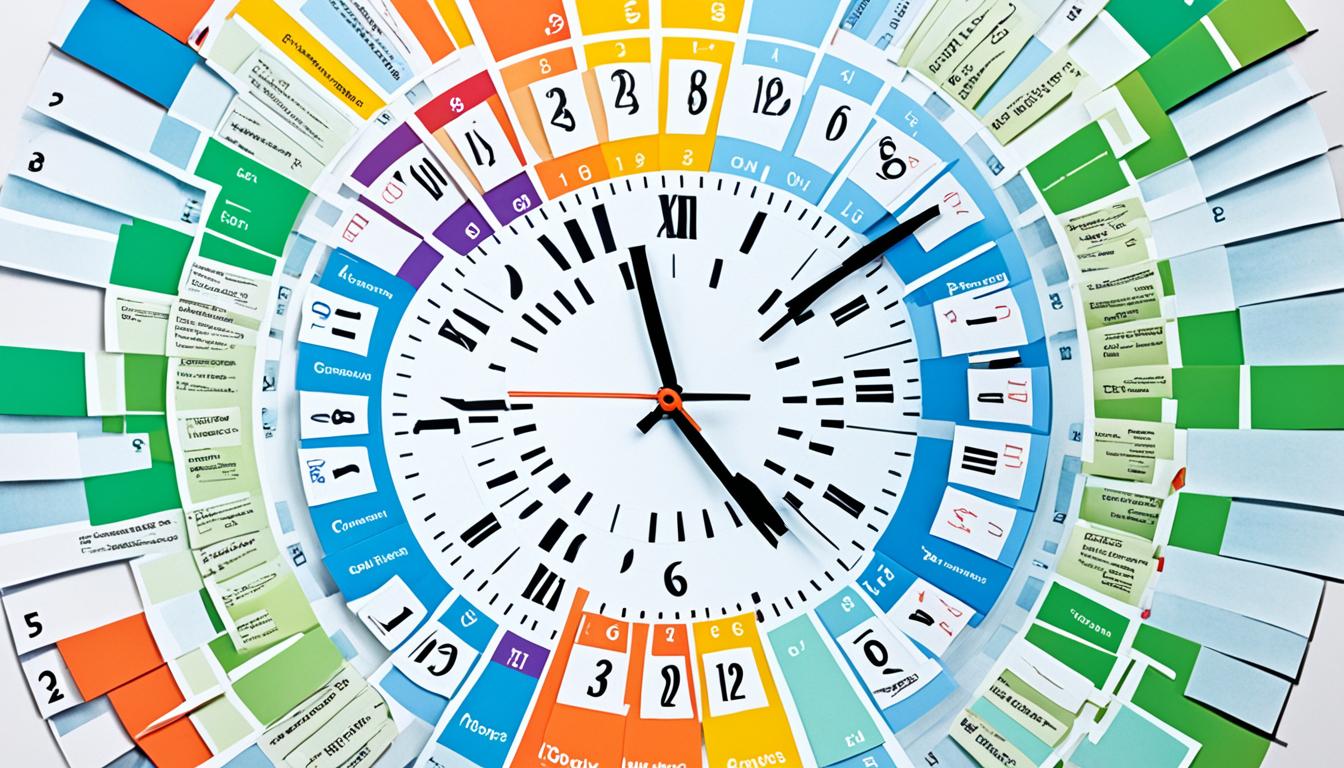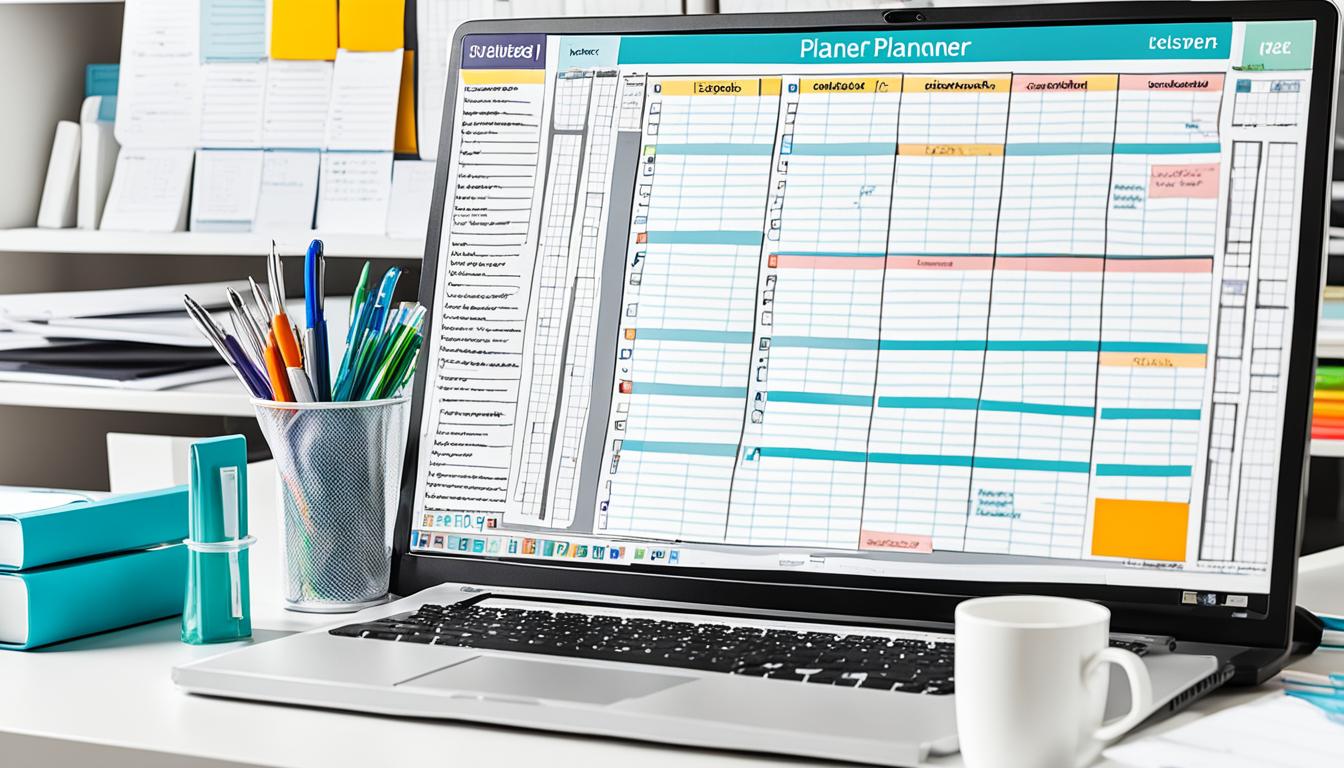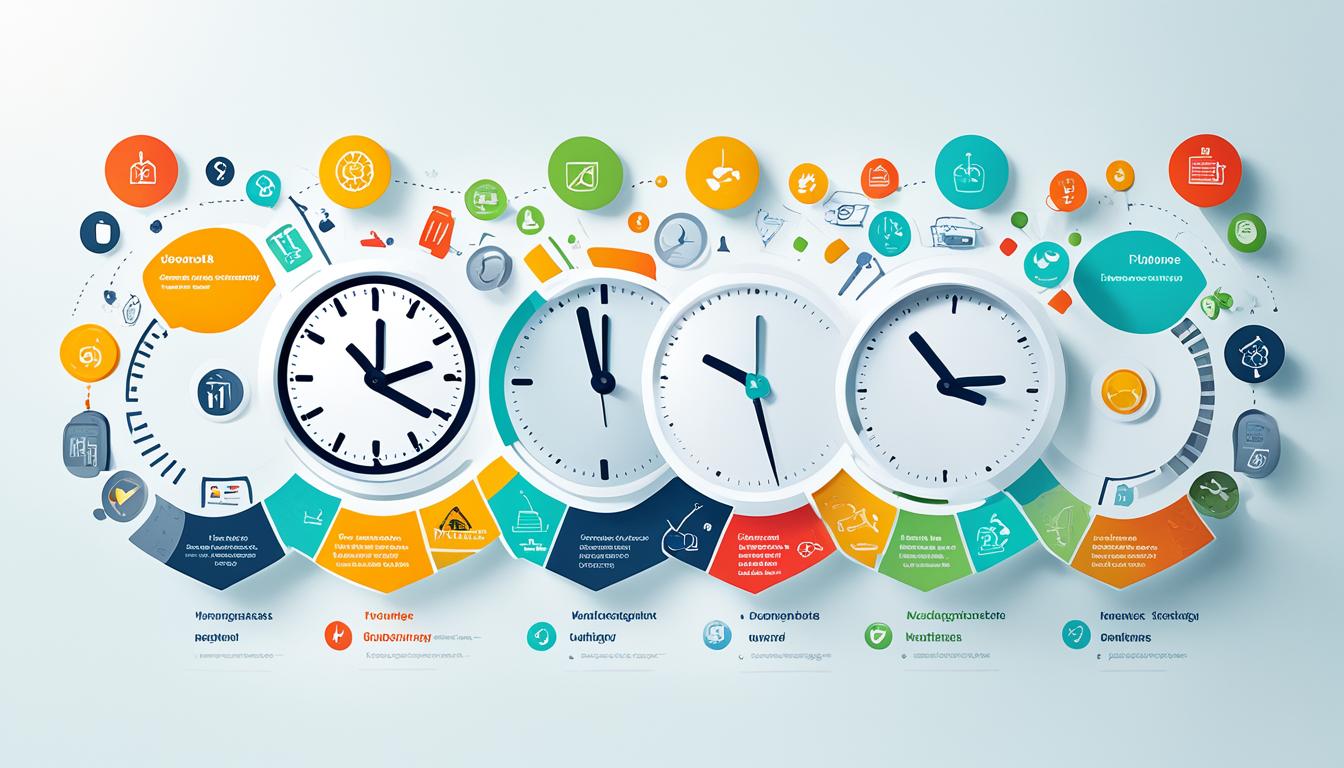Making a list of tasks is key to managing your time well. It helps you focus on important activities to reach your goals. Studies show that prioritization skills can make you 25% more productive at work. Putting your energy into main tasks helps you do better and hit big targets.
People who sort their tasks well are 40% better at managing their time. This method makes your work flow better and helps you form good habits. Zapier says having clear aims makes you 15% more likely to achieve them, especially if you prioritize.
One top benefit of ordering tasks is less stress. Good prioritization cuts stress by up to 30% when you’re swamped with work. By using your time on productive tasks, you stay productive. This keeps you motivated because you keep seeing good results.

The Importance of Effective Time Management
Being good at time management is key in our busy world. It means planning and organizing time well to boost productivity and make better decisions. By mastering time management, you can beat daily challenges, get more done, and use your time wisely.

Putting tasks in order can lower stress by focusing on what is urgent and important first. This focus increases productivity, sharpens concentration, and boosts happiness and drive. Following the 80/20 rule shows why it’s crucial to focus on tasks that have a big impact.
Tools like the ABCDE method and the Eisenhower matrix help in ranking tasks. They ensure a good balance between how much and how well you work. Choosing what to do first may be hard, but being flexible helps in making those tough choices.
Good time management boosts productivity by letting people set priorities and use their time well. This leads to getting more done. It keeps people motivated, on track with goals, and lowers stress. This results in better work.
Managing time well also builds stronger relationships at work. It fosters trust and reduces stress. It teaches discipline, helps focus on what matters, and keeps you away from wasting time. Well-planned time encourages creative thinking and solving problems.
For small businesses and freelancers, being efficient is critical for growth. Time management skills help in focusing on what needs to be done, reaching goals quicker. It also leads to a better balance between work and personal life, crucial for keeping clients and getting new ones.
In the end, knowing how to manage time can make your workday less stressful and more productive. It’s not just about controlling time, but making it work in your favor. This balance improves both your work life and your personal happiness.
Improved Productivity and Efficiency
Learning how to prioritize helps you spot what tasks matter most. This makes you more productive and efficient. By zeroing in on these important tasks, you get things done better and faster. You make sure the right tasks get the right focus and resources.
Focus on High-Impact Activities
The Eisenhower matrix helps sort tasks by urgency and importance. It has four categories: do, decide, delegate, and delete. The 80/20 rule shows doing 20% of tasks can lead to 80% of success. Using these tools helps focus on what brings the best results.
Minimize Distractions
It’s important to avoid distractions to stay focused on important tasks. The Pomodoro method is a way to work in short bursts and then take a break. This approach improves focus. By not doing many things at once, you can work better on one task. This helps increase work output and reduce delays.
Stress Reduction and Better Organization
Stress alleviation comes from a well-managed schedule. The Eisenhower matrix helps us prioritize tasks well. It makes us focus on what’s important for our long-term goals.
This way, we can be more productive and less stressed. Overworking can lead to job burnout, which hurts our health. So, by prioritizing, we keep our workload in check and stay organized.

Using a calendar and time blocking helps us stay focused. A study by Princeton University showed that clutter distracts us a lot. So, keeping our space clean is vital.
Regular check-ins and a clean workspace keep us stress-free. Reducing distractions saves a lot of time. Setting SMART goals and tracking our time improves productivity. This keeps us clear-headed and less stressed.
Enhanced Decision-Making Abilities
Task prioritization is a key to better decisions. It lets you see which tasks matter more. This method makes managing easier and smarter.
When you sort tasks well, making choices gets easier. This leads to using resources better. And boosts how much you get done.
Make Informed Choices
Choosing wisely is key for managing time well. Tools like the Eisenhower matrix help here. They show what needs doing now and what can wait.
This way, you put effort where it really counts. It helps you succeed. Using the Relative Priority or MITs method makes this even clearer.

Allocate Time Wisely
Prioritizing tasks means you invest time better. Consider due dates and how much time tasks need. This helps you focus on what’s important.
Using Brian Tracy’s ABCDE principle or timeboxing helps too. These strategies make sure you’re working on valuable tasks. It takes your decision-making to the next level.
Increased Ability to Achieve Goals
Setting goals helps you focus on what’s important. This makes sure your work always moves you forward. It lets you use your time and resources well.
When you know what’s most important, you get more done and feel less stressed. Studies show this leads to better work. Feeling calm and ready helps you do tasks well.
Tools like the Eisenhower Matrix help sort tasks by urgency and importance. The Pareto principle tells us focusing on key efforts brings most of our success. These strategies keep you on track to reach your goals.
It’s smart to check and adjust your goals regularly. Being flexible helps you not take on too much and stay motivated. This way, you keep focused on long-term goals.
Achieving goals makes us feel good and want to do more. Using SMART or WOOP methods can guide us to success. They offer clear plans to reach our goals.
Benefits of Prioritizing Tasks
Putting tasks in order can greatly boost how much you get done. It cuts down stress and lets you focus on key tasks. This way, less time is wasted on things that don’t matter much.
Cutting back on putting things off is another big plus. It means tackling the biggest jobs first helps reach major goals. It makes work flow better, saving precious time.
And it’s good for your mental wellness, too. Knowing what needs to be done makes you feel in control. So, you’re less bogged down and have time for fun, family, and hobbies.
Making smart choices about what to do next gets easier, too. This is crucial in managing projects well. It ensures urgent tasks get done right away, avoiding delays.
Last of all, knowing what’s most important helps get big wins in both work and life. It makes it easier to hand off tasks or drop them to stay productive. This keeps work flowing smoothly and boosts how well you do.
More Free Time for Leisure and Personal Development
Task prioritization lets us enjoy more free time and personal growth. Good time management and delegating tasks means we find moments for fun activities. These hobbies refresh us and make life fuller.
In the US, work days often last 8.5 hours. So, we must manage our time well. Working more than 55 hours a week can hurt our health badly. Good time management keeps our work and life in balance.
Creative activities lower stress and help fight depression. More than 80% of bosses think being creative is key. Fun activities make us work smarter and keep us productive.
Leisure time also cuts stress and helps our mental health. Just 30 minutes of exercise a day is very good for us. Learning new languages keeps our minds sharp and may slow aging by 4.5 years. Social activities build strong friendships and make us stronger inside.
Writing down our goals helps us reach them. This makes more time for fun and growing as a person. Hobbies help us stay sharp by relaxing our minds. They balance our work and joy perfectly.
Implementing Effective Time Management Techniques
Efficient time management can change how we handle tasks daily. It gives our routine structure and clarity. Using the Pomodoro Technique, time blocking, and daily lists can boost our productivity and time management.

Pomodoro Technique
The Pomodoro Technique involves working for 25 minutes then taking a 5-minute break. It keeps energy up and distractions low. After four cycles, you take a 20-minute break. It’s great for hard tasks or breaking them into parts, making us more efficient.
Using time management techniques like the Pomodoro helps track how we use time. This leads to a more productive, less stressful day.
Time Blocking
Time blocking sets specific times for tasks. It limits distractions and helps focus. By scheduling tasks around when we’re most energetic, we do important work at productive times. Time blocking helps maximize productivity by planning in 15-minute slots.
A personal planning tool works well for time blocking. It shows the day’s plan visually.
Creating Daily To-Do Lists
Daily to-do lists give a clear plan for the day. They help manage tasks and set priorities. List tasks as A (high priority), B (medium priority), or C (low priority) tasks. This structured approach follows the ABC prioritization method.
Organizing with daily lists reduces stress and makes time for fun activities. For tips on time management task prioritization, adapting these methods is key.
Better Work-Life Balance
Getting a better balance between work and life is key. It comes from managing your time and tasks well. From 2020 to 2023 in the US, jobs went up and down a lot. We saw lots of layoffs and people quitting in the Great Resignation. This showed how important it is to keep work and life in balance.
Keeping this balance makes you happy and good at your job. It lowers stress and makes you healthier. By planning well and having fun outside work, you feel better and have better relationships.
Planning your day helps a lot. Set times for work, fun, hobbies, and rest. Use apps to help manage your tasks and time. They make work easier and save time. Talking openly with your boss about your work style helps too.
Putting health first is very important. Do things that help you relax and enjoy time with friends. Adapt to changes and keep checking on how you’re doing. Setting these limits can make you work better and be happier. Balancing work and life helps you grow in your career and personally.
Conclusion
Getting good at task prioritization leads to more work done and less stress. People who prioritize well handle life’s challenges better. They also adjust more easily.
Using smart methods like the Eisenhower Matrix and the Pomodoro Technique boosts efficiency. 70% of product managers rely on the Eisenhower Matrix. It sorts tasks by how urgent and important they are.
50% prefer the Pomodoro Technique for better time management. It helps focus on key tasks and avoid distractions.
To stay productive, it’s vital to regularly check and update your priorities. Being flexible and adaptable increases productivity and creativity. Knowing what’s important helps in making smart choices. This leads to success in both personal and work life.
FAQ
What are the benefits of prioritizing tasks?
Prioritizing tasks improves time management and increases productivity. It also lessens stress and keeps things organized. Doing this, you can reach your goals clearer and faster.
It makes you stay on track with important jobs. This cuts down on wasted time. And it helps you develop good habits too.
Why is effective time management important?
Good time management is key for tackling daily tasks. It helps you do more and use your time well. You can handle life’s ups and downs better and stay calm.
How does prioritization improve productivity?
When you prioritize, you focus on big-impact tasks. This cuts down on distractions. So, you get more done and are less likely to put things off.
Can prioritizing tasks help in reducing stress?
Yes, setting tasks by priority lowers stress by making a to-do plan clearer. It helps you stay organized. With a plan, facing challenges is easier and less stressful.
How does task prioritization enhance decision-making abilities?
Prioritizing makes you weigh the importance of tasks. This sharpens your ability to make choices. You get good at focusing on tasks that matter the most.
What role does prioritization play in achieving goals?
Prioritizing is key to reaching your goals. It shows you what tasks to focus on. By doing this, you steadily work towards your goals.
How does prioritizing tasks benefit one’s overall performance?
Putting tasks in order boosts overall performance. It leads to doing high-impact work and not wasting time. Your productivity goes up, and you work better.
Can prioritizing tasks offer more free time for personal development?
Yes, by managing your time well and delegating tasks, you get more free time. This lets you do things you enjoy and grow personally.
What are some effective time management techniques?
Effective techniques include the Pomodoro Technique, time blocking, and daily lists. These help you arrange your tasks, focus, and suit different styles of working.
How does prioritization contribute to a better work-life balance?
Prioritizing balances your job and personal life, making both better. It lowers stress, keeps you motivated, and helps you grow in all life aspects.

More Posts
Plan Your Week With Calendar Planner For Work-Life Balance
Do you need help with constantly running out of time and missing important deadlines? Do you need help to keep a balance between your work and personal life? Now, you can implement better...
8 Best OKR Books for Better Understanding
You can find ample information about OKRs over the internet, but to date, many businesses and individuals are struggling to make the correct use of it. OKRs are not something that you can...
11 Tips to Plan Successful Webinar A Checklist
Webinars are a great way to engage people online. But, planning a successful one takes a lot of work. Even a small mistake can change the whole outcome. Marketers say webinars will be...
Productivity Management Guide for Entrepreneurs
Navigating the entrepreneurial landscape can often feel like trying to bring order to chaos, especially when it comes to managing productivity. As a busy entrepreneur, are you constantly grappling with email chaos, struggling...